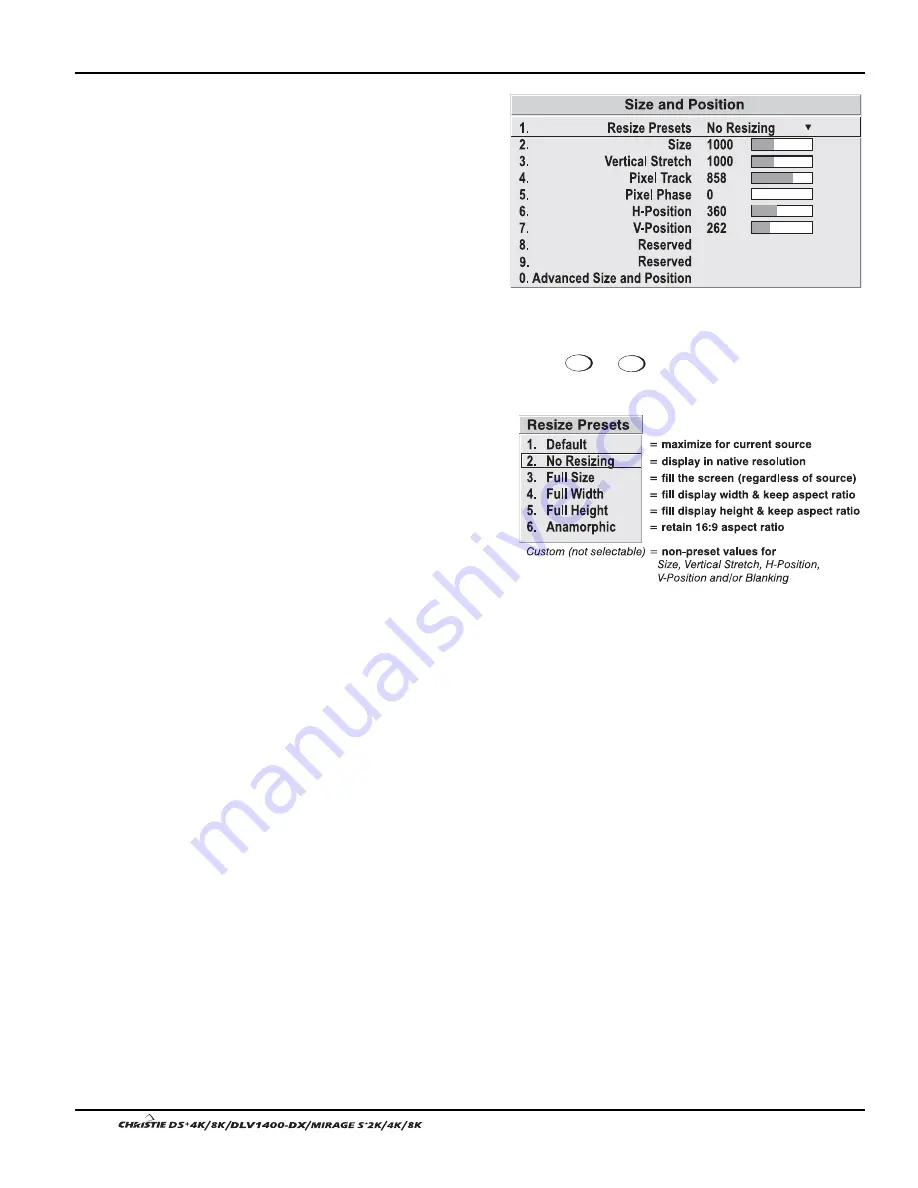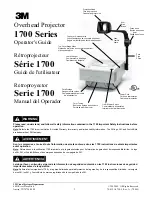
Section 3: Operation
3-20
User’s Manual
In the Size and Position menu,
you can increase or decrease
the size of your image, change
its proportion (aspect ratio),
move the image to a specific
area of the screen, and refine
other related parameters. Use
Size and Position controls to
match the image precisely to
the screen used at the site.
Refer to "Using Slidebars and
Other Controls" (earlier in this section) if you need help using any of the options and
controls. Changes made in the Size and Position menu are applied immediately and
are saved when you exit the menu (press
Exit
or
Menu
).
Resize Presets
Select a Resize Presets option
to quickly display an image in
its native resolution or to
automatically resize an image
to closely fill the projector’s
native resolution of 1400 x
1050, or to optimize the width
or height of your display. Size,
Position and Blanking
parameters will automatically
adjust accordingly, or if Blanking is set first, which defines an Active Input Area,
Resize Preset scaling will occur in this region of interest only. Resizing options are
explained in detail below.
WHAT IS THE RESIZING DEFAULT?
By default when displaying a new source, your
image will utilize as much of the projector’s display area (1400 x 1050) as possible for
the type of incoming source data, but with minimal or no changes to aspect ratio. See
Select “Default” below.
WHEN “CUSTOM” APPEARS:
The “Custom” re-size descriptor automatically appears in
the Size and Position menu when any of the values for Size, Vertical Stretch, H-
Position, V-Position or Blanking do not correspond to those for a preset. This option
is not offered in the Resize Presets pull-down list.
•
Select
“DEFAULT”
for most sources (factory default). The image will be centered
and displayed as large as possible depending on the type of source, as described
below:
T
A 5:4 graphic image will enlarge to fill the screen height, and be centered
between narrow black side bars.
T
A video image or 4:3 graphic image will enlarge to fill the screen.
T
An anamorphic (16:9) image will fill the width and be centered between
black bars on top and bottom.
Size and Position Menu
'
Summary of Contents for DS+4K
Page 2: ......
Page 11: ...Section 2 Installation and Setup User s Manual 2 7 Figure 2 2 Vertical Offset Examples...
Page 12: ...Section 2 Installation and Setup 2 8 User s Manual Figure 2 3 Lens Vertical Offsets...
Page 14: ...Section 2 Installation and Setup 2 10 User s Manual Figure 2 5 Lens Horizontal Offsets...
Page 22: ......
Page 75: ...Section 3 Operation User s Manual 3 53 Figure 3 29 Customizing the Input Signal...
Page 92: ......
Page 102: ...Section 4 Maintenance 4 10 User s Manual Figure 4 8...
Page 106: ......
Page 120: ......
Page 122: ......
Page 124: ...Appendix C Serial Communication Cables C 2 User s Manual...
Page 126: ...Appendix D Throw Distance D 2 User s Manual...
Page 127: ...Appendix D Throw Distance User s Manual D 3...
Page 128: ...Appendix D Throw Distance D 4 User s Manual...
Page 129: ...Appendix D Throw Distance User s Manual D 5...
Page 130: ...Appendix D Throw Distance D 6 User s Manual...
Page 131: ...Appendix D Throw Distance User s Manual D 7...
Page 132: ...Appendix D Throw Distance D 8 User s Manual...
Page 133: ...Appendix D Throw Distance User s Manual D 9...
Page 134: ...Appendix D Throw Distance D 10 User s Manual...
















































